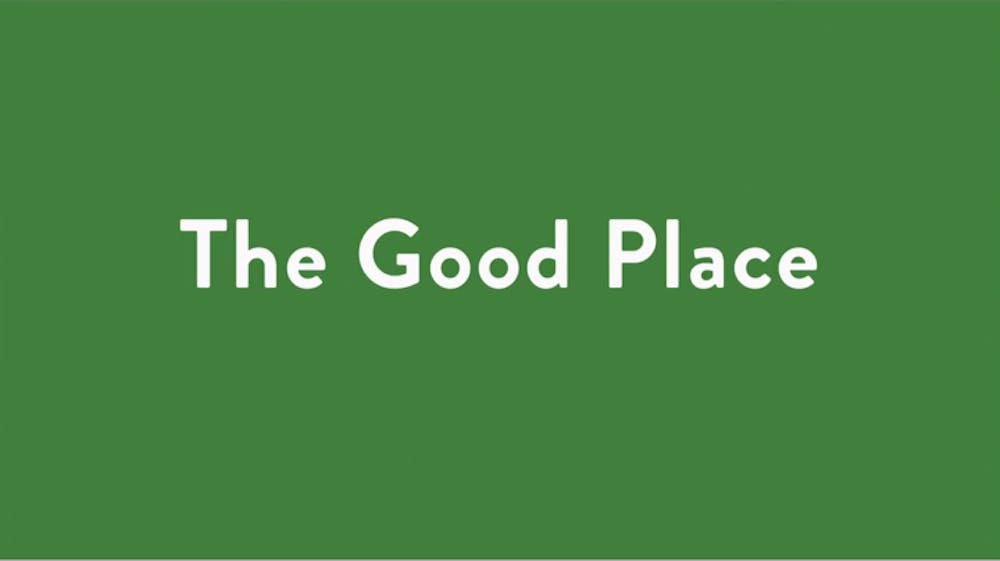Princeton is no stranger to pop culture — from serious literature to comedy television, from admiration to derisive dismissal, references to the University run amok. Hemingway’s “The Sun Also Rises” and Fitzgerald’s “This Side of Paradise” both include characters that attend or have attended the University.
At present, asking Princeton students whether they’ve seen a “A Beautiful Mind” within minutes of meeting them appears to be a universal mandate. “A Cinderella Story” tells the story of the great love between Chad Michael Murray and Hilary Duff, built almost entirely on their mutual interest in the University. And then there’s Blair Waldorf in “Gossip Girl,” who calls Princeton a “trade school” when it is proposed as an alternative to Yale.
Princeton alumni scatter the seas of popular entertainment, from the “Fresh Prince of Bel-Air” to “Cruel Intentions.” But none so far have been quite as devastating in their commentary as the “Good Place,” which features Brent Norwalk, a Princeton graduate and otherwise all-round demon, in its latest season.
For context (spoilers ahead!), the fourth and final season of “The Good Place” revisits its original experiment, attempting to exhibit how, in the less complicated and less ethically-ambiguous afterlife, even the worst humans on Earth can discover it in themselves to become better people. The experiment involves four new candidates, one of whom — and the one most pertinent to my discussion — is a parody of Brett Kavanaugh. His name is Brent Norwalk.
Norwalk is sexist, misogynistic, chauvinistic, and staunchly Princetonian. His biggest accomplishment involves converting the $90 million “materials company” he inherited into a $94 million conglomerate. He claims he isn’t racist because he had a black dentist. He dies just as he’s about to get MeToo-ed by several of his female colleagues. He rolls his eyes at the idea of being politically correct, citing terms such as “vice-president in charge of helping” and “Captain Marvel” as examples.
Oh, and he attended Princeton. Yes, Princeton. The Ivy. Graduated from the top half of the bottom half. At Princeton. Knew the rowing team. Princeton’s. Hung out with the class president. Of Princeton. Got a B-plus on his Moral Values class. At Princeton.
Over the span of the episode, it’s easy to laugh at Brent, at his inability to hold a single conversation sans at least one reference to his alma mater. In fact, it feels fairly realistic, if the outrageously orange jackets of the alumni at pre-rade have anything to say for school spirit. Brent says of his acceptance, “No handouts, by the way. I earned my spot there, just like my father, and his father before him” — a dig at the University’s longstanding practice of legacy admissions.
It’s easy to feel spurts of joy, too. I had to pause the episode as soon as it mentioned Princeton; the idea that one of my favorite comedies might allude to my university a month after I started studying there had me in a frenzy of delight.

There’s a point at which the afterlife devolves into a chaotic disarray intended for Brent to realize he doesn’t belong in the Good Place; it’s startlingly orange and black, abounds with huge tiger mascots, and infused me with such warmth, I could barely keep the smile off of my face. But when the screen goes black, and you’re left within the walls of that very institution, it’s also easy to wonder why somebody as vile as Norwalk ever belonged here.
What irks me about Brent is not his infuriatingly awful personality — that outright pisses me off — it’s what a huge part of his identity being a Princetonian is. He is as much Princetonian as he is a racist, sexist, and extremely entitled douchebag with no self-awareness and no empathy.
I don’t doubt that there is some truth to his character; for most people, the term “Ivy League” is still associated with images of elitism and wealth, of entitled men on sailboats playing golf, of homogeneity and affluence. For one, pop culture is obsessed with it.
And yes, we were that at one point, but the important thing to acknowledge and recognize is that we aren’t anymore. We’re past the days of Princeton being a university for the wealthy, or a place where women and people of color could be restricted from admission.

Financial aid and affirmative action initiatives have shot up over the past couple of decades. In the last month and a half, as a freshman at Princeton, I’ve already encountered the most diverse group of people I’ve had the chance to meet, both racially and socioeconomically. Princeton students are no longer a homogenuous array of legacy and inheritance.
They are diverse, modest, sincere, and smart. Maybe it’s time to retire the elitist, out-of-touch, born-with-gold-studded-spoons tag that seems to accompany any and every mention of a Princetonian in pop culture.
But then again, I just wrote an 800-word article complaining about my education’s connotations. So, maybe not.








